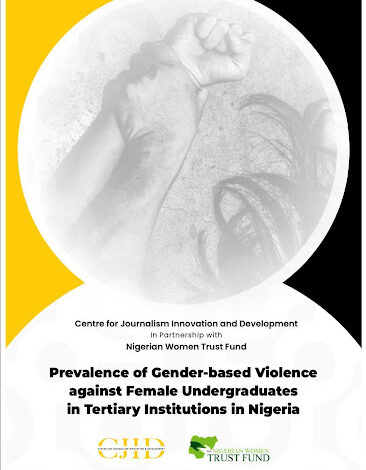GBV Prevalence Among Nigerian Female Tertiary Students ~ A CJID Study
The research by CJID, in partnership with the Nigerian Women Trust Fund (NWTF), made some insightful findings on some of the issues around sexual harassment in academic institutions

Nigerian Media think tank, Center for Journalism Innovation and Development (CJID), in partnership with the Nigerian Women Trust Fund (NWTF), has published a research report looking into the prevalence of violence against women in tertiary institutions.
The report, titled “Prevalence Of Gender-Based Violence Against Female Undergraduates In Tertiary Institutions In Nigeria”, was officially published on Thursday, Aug. 31 after a webinar marking its launch.
The report is coming on the heels of a protest against sexual harassment of female students held in the Federal University Of Calabar, South-South Nigeria.
During the virtual launch of the research, CJID said the report, which features respondents from various universities in Nigeria, seeks to – among other things – provide a body of knowledge on the widely discussed issue in the country. To do this, the report posed and answered important questions such as the different forms in which violence against female undergraduates is perpetrated, the punitive measures put in place by school authorities, how victims handle it, and their knowledge of school policies against abuse.
Findings
On the different forms of GBV and their prevalence in tertiary institutions, the study found that sexual violence is the most prevalent, followed by psychological violence at 25.5 per cent.
Other forms of GBV noted by respondents include socio-economic violence and physical violence.
Students make up a majority of perpetrators, with 37.3 per cent, followed by academic staff at 26.7 per cent. Other perpetrators mentioned in the study are administrative staff, security agents, intimate partners, and community members.
The report found that the majority of female students sampled for the research have not been victims of GBV and among those who have been, only 16.2 per cent of them reported it to appropriate authorities while 64.9 per cent were quiet about it, with 10.8 per cent of the respondents taking laws into their own hands.
A majority of students have witnessed, seen or heard about GBV in their campuses but did not report to appropriate quarters for reasons bordering on “security intervention, past experiences that backfired, fear, and nobody/authority to report.”
Some of the punishments given to perpetrators of GBV against female undergraduates include suspension, expulsion, prosecution, beatings, and warnings, with no punishment given to them 15.8 per cent of the time.
The study found that most students do not find the punitive measures satisfactory. It also found that the reporting channels in tertiary institutions are inadequate.
Other findings such as participation in awareness programs, availability of GBV reporting desks, and others were made in the study.
It concludes that “gender-based violence remains a distressing reality on college and university campuses,” with consequences stretching into stunted academic and personal growth, among other negatives.
Gender-based violence has for a long time been a persistent issue in tertiary institutions around Nigeria.
As noted in the study, students who are targeted hardly come forward with complaints.
Recently, however, law students at the University of Calabar showed uncommon courage by protesting openly about sexual harassment in their law faculty.
This has led various Non-Governmental Organisations, (CJID inclusive) to call on Nigeria’s President, Bola Ahmed Tinubu, to assent to a bill that seeks to curb the practice by “criminalising the act of neglect or failure of administrative heads of tertiary educational institutions to address complaints of sexual harassment within a specified period of time,” and remove mutual consent as a way of making sex for grades a “strict liability offence.”
The recently published study by the organisations aims to serve as another call on the government and policymakers to look into highlighted issues.
Summary not available.
Support Our Journalism
There are millions of ordinary people affected by conflict in Africa whose stories are missing in the mainstream media. HumAngle is determined to tell those challenging and under-reported stories, hoping that the people impacted by these conflicts will find the safety and security they deserve.
To ensure that we continue to provide public service coverage, we have a small favour to ask you. We want you to be part of our journalistic endeavour by contributing a token to us.
Your donation will further promote a robust, free, and independent media.
Donate HereStay Closer To The Stories That Matter




